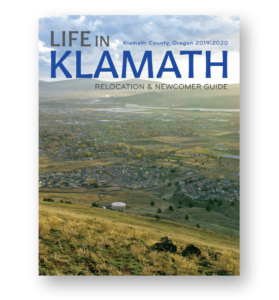

Director, Oregon Small Business Development Center
Launching a new business under personal passions or a great idea can be an exciting time filled with great aspirations and expectations; but with it too comes laborious tasks, daunting costs, and great risk. Fortunately, entrepreneurs who choose to enter the business fray are not alone, as the KCC Small Business Development Center (SBDC) offers extensive assistance to help both new and established businesses prosper.
The local center, part of a national network, operates through federal funds and added support from Business Oregon via lottery dollars. In order for a community to have an SBDC, they must have a local host institution who is willing to match federal dollars. For years Oregon Tech served in that role, but now Klamath Community College (KCC) offers oversight.
Offering no-cost business advice and support to entrepreneurs, every concept is aided through one-on-one advisement, and specialized programs aimed at supporting business owners and their top-line managers. “Chiefly we provide advice and training to for-profit businesses; our target is not workforce – we support business owners or those that want to be,” said Kat Rutledge, director for the KCC SBDC. “We serve 60 percent existing businesses, and 40 percent are what we call ‘pre-venture clients.’ We help people get started,and we help people get stronger.”
Rutledge sees many advantages for those considering establishing a new business or relocation to the Klamath Basin, including quality of life, a rural lifestyle matched with many amenities, an abundance of outdoor experiences readily available, and a generally low cost of living. She sees outdoor experiential tourism as being most attractive to millennials – the largest group in the current workforce.
Communities such as Bend that offer biking, hiking, rafting, kayaking and more have been flooded with people – Bend has been has rated the fastest-growing city in America several years in a row – and that glut has resulted, according to Rutledge, in many suggesting Klamath County as an enticing alternative, where many of those outdoor opportunities also readily exist.
“We are seeing people come here from areas like Bend and Redding, we are also seeing an influx from higher expense areas like San Francisco,” said Rutledge. “I think there are exciting trends that we can seize upon, and we can have a good influence on what happens.”
Access to SBDC services is easy – people can walk into the office location, located on the second floor of Washington Federal Bank Building in downtown Klamath Falls, or visit www.bizcenter.Org/kcc to register for advising sessions or one of several class offerings.
“We believe that our economy wins by having as many fingerprints on each entrepreneur as possible, because it means everyone is trying to help,”
Unlike investment bankers who must consider feasibility of ventures, the SBDC does not serve to say yes or no to a business idea. Rather, SBDC staff work directly with entrepreneurs to assure that they receive advice on the various aspects of launching or running a business. They will walk business owners through considerations be it financial or cultural to maximize their business potential and encourage partnerships and referrals for others who may be able to assist. The only restrictions are that the business concept must be legal – and since SBDC’s are federally-funded, that doesn’t include any cannabis-related ventures at this time despite its legalization in Oregon.
One of the SBDC’s key developments has been a program designated for existing businesses titled, “Small Business Management” – a three-year program spanning the gamut of business know-how. Held during the academic calendar year, monthly participation requires one three-hour class and two hours of advisement. Year one covers a wide range of topics, while the second and third years of involvement take a deeper dive into financials, human resources, and marketing.
“They must create a learning contract – we say their business is their textbook – so they will learn a regimented amount of topics; but how they apply them caters directly to their business,” said Rutledge. “They are considered KCC students, and we have found our program to be very impactful. It is very neat to spend long-term quality time with business owners.”
Another group offering, aimed specifically at pre-venture clients, is the “Smart Startup Workshop,” provided every 10-12 days. The two-hour workshop preps individuals with everything they need to know about opening a business in the region; from insurance to acquiring an EIN and more. A large supporter of the Klamath IDEA (Inspire Development Energize Acceleration), SBDC and other like minded organizations work closely to offer a wealth of support and knowledge to local entrepreneurs in the hopes of molding a culture of collaboration under the concept that economic prosperity is a team sport.
“We believe that our economy wins by having as many fingerprints on each entrepreneur as possible, because it means everyone is trying to help,” added Rutledge. “Creating that culture means partners have to participate and have a trusting relationship. We need to invest financially as a community, and support our entrepreneurs.”
Through Klamath IDEA partners, a bigger-picture perspective has grown to develop a culture of networking. Events like IDEA Talks and the Chamber’s Rural Business and Innovation Summit provide opportunities for guest speakers, networking, and discussions about issues pertinent to rural businesses.
At its core, the SBDC remains a helpful tool for as little or as much time as entrepreneurs choose to invest in it to help their businesses grow. “Entrepreneurs don’t come in asking what businesses are needed here. They walk in with an idea and want to know what we can do to help.” For more information about SBDC and services visit www.bizcenter.org/kcc














